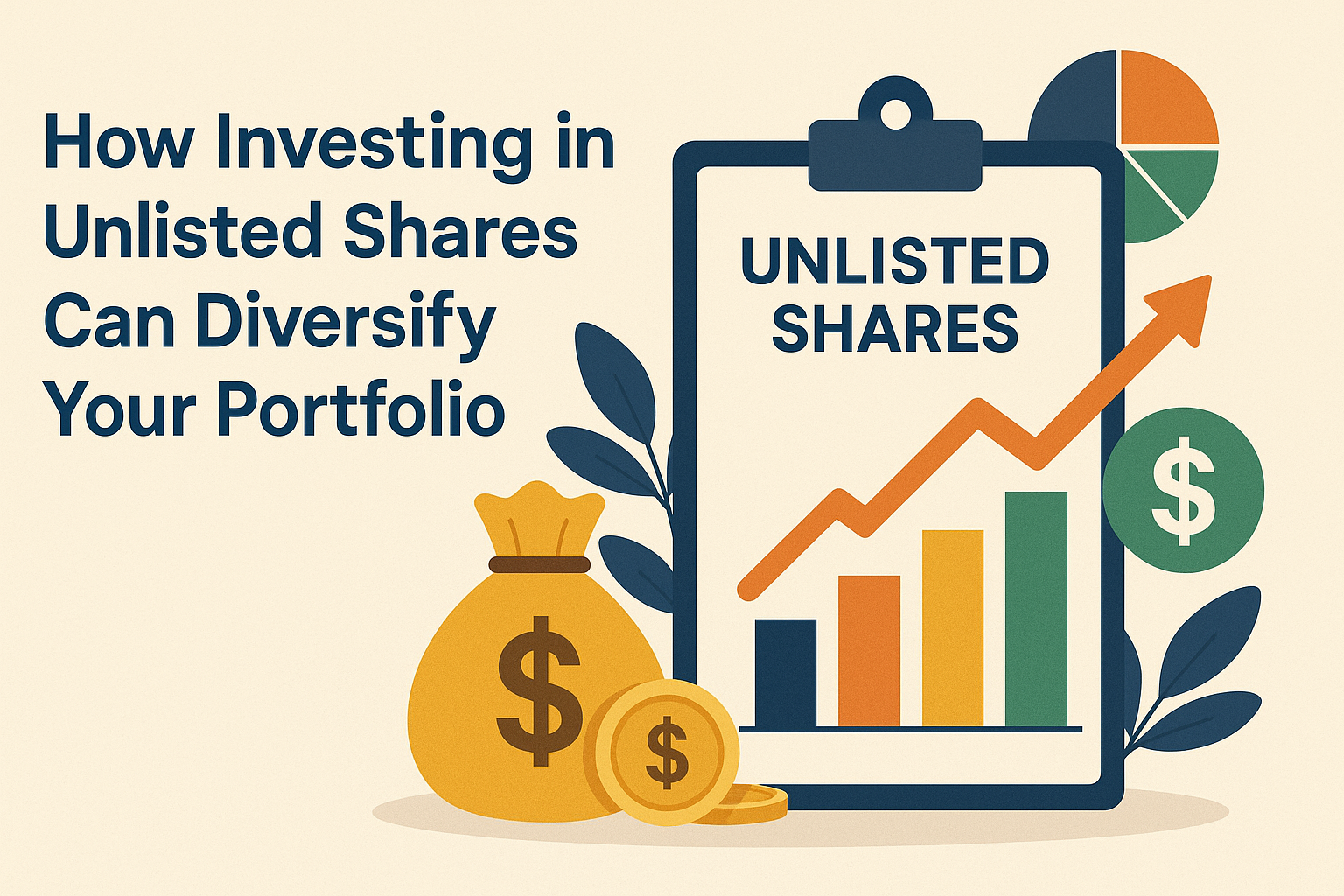In today’s evolving investment landscape, sophisticated investors are increasingly looking beyond traditional market options. Unlisted shares securities not traded on public stock exchanges represent a compelling yet often overlooked avenue for portfolio diversification. At Dhan Kirti, we’ve observed growing interest in this asset class as investors seek alternative growth opportunities with potentially higher returns.
Understanding Unlisted Shares
Unlisted shares represent ownership in private companies that haven’t gone public through an IPO. These companies operate across various sectors—from emerging tech startups to established family-owned businesses with decades of operational history.
Unlike listed equities that trade on exchanges like NSE and BSE with real-time price discovery, unlisted shares operate in a more relationship-driven marketplace. Their valuation and trading occur through private negotiations, often facilitated by specialized intermediaries.
According to a 2023 report by Praxis Global Alliance, India’s private market capitalization has grown at approximately 30% annually over the past five years, significantly outpacing public market growth rates of 12-15%.
Key Benefits of Including Unlisted Shares in Your Portfolio
1. Enhanced Diversification Potential
True diversification extends beyond simply holding different publicly traded stocks. Unlisted shares offer exposure to:
- Companies at different growth stages than those typically available on public exchanges
- Unique business models that may not have public market equivalents
- Sectors underrepresented in public markets
A 2024 JP Morgan Private Banking report indicates that portfolios incorporating 15-20% allocation to private investments demonstrated up to 20% lower volatility during market downturns compared to purely public market portfolios.
2. Reduced Correlation With Public Markets
Unlisted shares typically exhibit lower correlation with public market movements, providing valuable insulation during market volatility. During the 2020 market crash, while public indices fell approximately 30%, private company valuations experienced a more modest average decline of 15-18%, according to data from Venture Intelligence.
3. Access to High-Growth Potential
Many companies choose to remain private longer, with significant value creation occurring before public listings. For instance:
- Zerodha, India’s largest stockbroker, remained unlisted while growing to a $2 billion valuation
- Ola Electric built substantial value as a private company before its recent IPO
- BYJU’S reached a $22 billion valuation while remaining private
By investing in unlisted shares, we gain exposure to this value creation phase that public market investors typically miss.
4. Potential for Superior Returns
Historical data suggests unlisted shares can deliver attractive long-term returns. According to a 2023 Preqin report, private equity investments globally have outperformed public markets by an average of 5-7% annually over ten-year periods.
In the Indian context, early investors in companies like Paytm, Nykaa, and PolicyBazaar realized returns ranging from 5x to 50x their initial investments when these companies eventually went public.
Key Considerations Before Investing
1. Liquidity Constraints
Unlike public market investments, unlisted shares cannot be instantly converted to cash. The average holding period typically ranges from 3-7 years, with exits dependent on:
- Company going public through an IPO
- Secondary sales to other private investors
- Acquisition of the company
We recommend allocating only capital that won’t be needed in the short to medium term.
2. Valuation Challenges
Determining fair value for unlisted companies requires sophisticated analysis in the absence of market-based price discovery. We consider:
- Recent transaction prices for similar companies
- Industry-specific valuation multiples
- Comparable public company benchmarks
- Discounted cash flow analysis
3. Information Asymmetry
Unlisted companies have limited disclosure requirements compared to listed entities. This information gap necessitates:
- Thorough due diligence before investment
- Relationship building with company management
- Industry expertise to evaluate growth prospects
4. Regulatory Considerations
In India, unlisted share transactions must navigate specific regulatory frameworks:
- Securities transfer must comply with Companies Act provisions
- Tax implications differ from listed securities
- KYC and documentation requirements are more extensive
How to Start Investing in Unlisted Shares
1. Determine Appropriate Allocation
Financial advisors typically recommend limiting unlisted share exposure to 10-30% of an investment portfolio, depending on your:
- Risk tolerance
- Investment time horizon
- Liquidity needs
- Overall financial situation
2. Work With Specialized Intermediaries
Given the private nature of these markets, working with reputable intermediaries like Dhan Kirti provides:
- Access to quality deal flow
- Valuation guidance
- Transaction execution
- Post-investment monitoring
3. Focus on Quality and Governance
When evaluating unlisted investment opportunities, prioritize:
- Companies with strong governance practices
- Transparent financial reporting
- Experienced management teams
- Clear path to liquidity (potential IPO or acquisition)
4. Diversify Within Your Unlisted Portfolio
Even within your unlisted allocation, diversification matters. Consider spreading investments across:
- Different sectors
- Various company stages (early growth, mature private)
- Multiple investment vintages (years)
Current Trends in the Unlisted Shares Market
The unlisted shares market in India has evolved significantly in recent years:
1. Growing Institutional Interest
According to a 2024 SEBI report, alternative investment funds focused on unlisted securities have grown their assets under management by 42% year-over-year, reaching ₹7.4 lakh crore.
2. Increasing Retail Participation
Platforms facilitating fractional ownership have lowered minimum investment thresholds from ₹25-50 lakhs to as low as ₹1 lakh, democratizing access to this asset class.
3. Regulatory Evolution
Recent regulatory developments have improved transparency and standardization:
- Enhanced disclosure requirements for large private companies
- Improved framework for secondary transactions
- Greater oversight of intermediaries
4. Pre-IPO Opportunities
With over 100 companies in India’s IPO pipeline for 2024-25, the pre-IPO segment has become particularly active, offering potential near-term liquidity events for private investors.
Case Study: Success Stories in Unlisted Investments
Zomato Pre-IPO Investments
Early private investors who purchased Zomato shares in 2019-2020 at valuations of $3-4 billion realized returns exceeding 300% when the company went public in 2021 at a $9 billion valuation.
DMart (Avenue Supermarts)
Before its blockbuster IPO in 2017, DMart shares traded in the unlisted market at approximately ₹500-700. Post-listing, the share price surged to over ₹2,500 within a year, delivering exceptional returns to early private investors.
Conclusion: Balancing Opportunity and Prudence
Unlisted shares represent a compelling diversification opportunity for sophisticated investors willing to accept limited liquidity in exchange for potentially enhanced returns. The private markets’ continued growth, coupled with increasing accessibility, makes this asset class increasingly relevant for comprehensive portfolio construction.
At Dhan Kirti, we help investors navigate these opportunities with rigorous due diligence and personalized guidance. We believe a disciplined, well-researched approach to unlisted shares can meaningfully enhance long-term portfolio performance.
Ready to explore how unlisted shares might fit into your investment strategy? Connect with our team to discuss your specific objectives and suitable opportunities in this dynamic market segment.
Frequently Asked Questions
What is the minimum investment required for unlisted shares?
While historically unlisted shares required substantial investments (₹25 lakhs+), modern platforms now offer entry points from ₹1-5 lakhs for fractional ownership. At Dhan Kirti, we typically recommend starting with at least ₹5 lakhs to build a properly diversified unlisted shares portfolio.
How are unlisted shares taxed in India?
Unlisted shares held for more than 24 months are considered long-term capital assets. Long-term capital gains are taxed at 20% with indexation benefits. Short-term gains (holding period less than 24 months) are taxed at your applicable income tax slab rate. Additionally, unlike listed shares, there’s no Securities Transaction Tax (STT) on unlisted share transactions.
What happens to my unlisted shares if the company goes public?
When a company you’ve invested in goes public through an IPO, your unlisted shares typically convert to listed shares after a mandatory lock-in period (usually 6-12 months). This conversion provides liquidity and often realizes significant value appreciation, as IPO valuations frequently exceed private market valuations.










